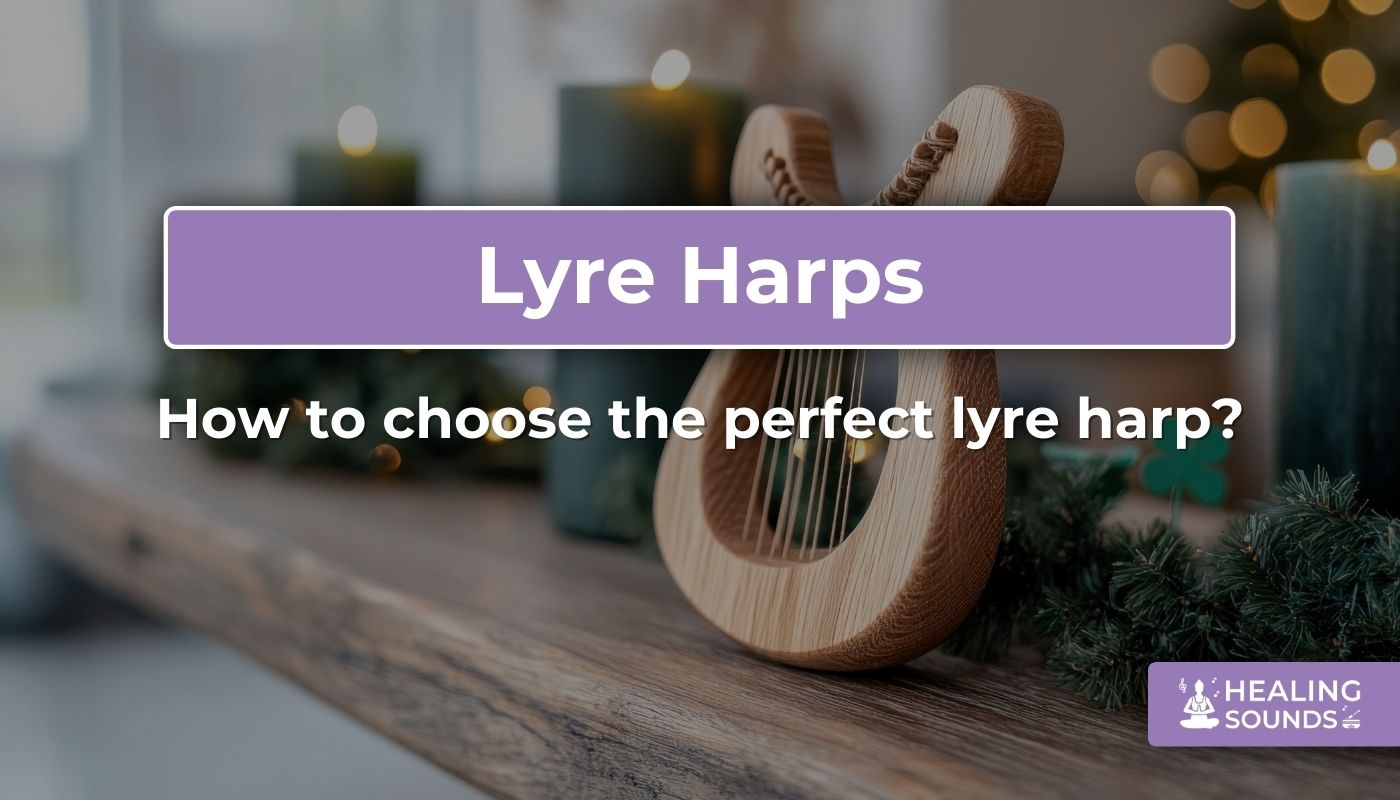Die Suche nach der perfekten Leierharfe kann aufregend sein, angesichts der großen Auswahl aber auch etwas überwältigend. Aber keine Sorge! Wenn Sie dieses bezaubernde Instrument verstehen, wird der Auswahlprozess von komplex zu fesselnd. Eine Leierharfe besteht aus mehr als nur Saiten und Holz; sie ist ein Gefäß für wunderschöne Melodien, die Ruhe und Harmonie in Ihr Leben bringen können. Bei Healing Sounds ist es uns ein Herzensanliegen, Sie mit hochwertigen Instrumenten zu verbinden, die Ihnen ruhige und klangvolle Musikerlebnisse bieten. Egal, ob Sie ein neugieriger Anfänger sind, der seine ersten Schritte in der Musik macht, oder ein fortgeschrittener Spieler auf der Suche nach einem neuen Klang – zu lernen, wie Sie die perfekte Leierharfe auswählen, ist entscheidend. Dieser Leitfaden führt Sie durch die wichtigsten Faktoren, die Sie berücksichtigen sollten, und hilft Ihnen, eine fundierte Wahl zu treffen, die Ihren musikalischen Ambitionen und Bedürfnissen entspricht.
Warum eine Leierharfe wählen?
Die Leierharfe besitzt einen einzigartigen Charme, der sie von anderen Saiteninstrumenten unterscheidet. Ihre Geschichte reicht bis in die Antike zurück und wird oft mit Geschichtenerzählen, Poesie und Momenten der stillen Besinnung in Verbindung gebracht. Für Liebhaber moderner Musik, insbesondere für diejenigen, die sich zu beruhigenden Klängen oder Klangtherapie hingezogen fühlen, bietet die Leier einen zugänglichen Einstieg. Ihre typisch diatonische Stimmung macht es relativ einfach, angenehme Harmonien zu erzeugen, was die Leierharfe für Anfänger zu einer ausgezeichneten Wahl macht. Die sanften, ätherischen Töne eignen sich auch gut zur Entspannung, Meditation und zum Erforschen des therapeutischen Potenzials der Musik.
Schlüsselfaktoren in Ihrem Kaufratgeber für Leierharfen
Bei der Auswahl der besten Leierharfe müssen mehrere Elemente abgewogen werden. In diesem wichtigen Kaufratgeber für Leierharfen erfahren Sie, worauf Sie achten müssen.
Anzahl der Saiten: Einfachheit vs. Reichweite
Die Anzahl der Saiten beeinflusst maßgeblich den musikalischen Umfang und die Komplexität der Leier. Gewöhnliche Leierharfen haben zwischen 7 und 24 Saiten oder mehr.
- Weniger Saiten (z. B. 7–16): Diese sind für absolute Anfänger oft leichter zu handhaben. Sie sind in der Regel leichter, tragbarer und weniger einschüchternd zu erlernen. Eine 16-saitige Leierharfe ist ein beliebter Einstieg. Obwohl der Tonumfang begrenzt ist, eignen sie sich perfekt für einfache Melodien und Begleitungen.
- Mehr Saiten (z. B. 17–24+): Bieten einen größeren Tonumfang und ermöglichen komplexere Stücke und größere harmonische Möglichkeiten. Instrumente wie eine 17-saitige oder 24-saitige Leierharfe bieten mit zunehmender Spielstärke mehr Vielseitigkeit.
Berücksichtigen Sie Ihre musikalischen Ziele. Wenn Einfachheit und Tragbarkeit wichtig sind, beginnen Sie mit einer kleineren Saite. Wenn Sie komplexere Musik spielen möchten, ist eine höhere Saitenanzahl langfristig möglicherweise besser.
Materialien sind wichtig: Holzarten und Klangqualität
Das für den Korpus der Leierharfe verwendete Holz ist entscheidend für ihren Klang und ihre Langlebigkeit. Tonhölzer wie Mahagoni, Palisander, Ahorn oder Fichte werden oft aufgrund ihrer akustischen Eigenschaften ausgewählt.
Hochwertiges Massivholz erzeugt im Allgemeinen einen volleren, resonanteren Klang und ist langlebiger . Schichthölzer oder Laminate sind in der Regel günstiger und stabiler bei wechselnder Luftfeuchtigkeit, bieten aber möglicherweise weniger akustische Tiefe. Achten Sie bei der Auswahl einer Leierharfe auf die Verarbeitung und die Verarbeitung – sie beeinflusst sowohl den Klang als auch die Lebensdauer des Instruments.
Saitentypen: Nylon, Darm oder Stahl?
Die Saiten sind die Stimme Ihrer Leierharfe. Das Material beeinflusst Ton, Lautstärke und Spielgefühl.
- Nylonsaiten: Häufig bei vielen modernen Leiern, insbesondere bei Anfängermodellen. Sie erzeugen einen warmen, weichen Ton und sind im Allgemeinen sanfter für die Fingerspitzen.
- Darmsaiten: Bieten einen traditionellen, vollen und komplexen Klang und werden oft für historische Musik bevorzugt. Sie können feuchtigkeitsempfindlicher sein und erfordern mehr Pflege.
- Stahlsaiten: Erzeugen einen hellen, klaren und oft lauteren Klang. Sie sind langlebig und halten ihre Stimmung gut. Einige Leiern, wie bestimmte 24-saitige Modelle , verwenden Stahlsaiten für einen ausgeprägten Klangcharakter.
Größen und Tragbarkeit von Leierharfen verstehen
Leierharfen gibt es in verschiedenen Größen. Kleinere, leichtere Modelle eignen sich hervorragend für unterwegs, zum Üben an jedem Ort oder für jüngere Spieler. Größere Leiern haben in der Regel einen volleren Klang und einen größeren Tonumfang, sind aber weniger tragbar. Überlegen Sie, wo Sie Ihre Leier hauptsächlich spielen werden. Bleibt sie zu Hause oder möchten Sie sie im Freien oder zu Veranstaltungen mitnehmen? Die passende Größe für Ihren Lebensstil ist ein wichtiger Aspekt bei der Auswahl einer Leierharfe .
Tuning-Systeme und Stabilität
Die richtige Stimmung Ihrer Leierharfe ist für ein angenehmes Spielerlebnis unerlässlich. Die meisten Leiern verwenden Stimmwirbel (Zitherwirbel), die mit einem Stimmschlüssel gedreht werden. Hochwertige Hardware sorgt für eine bessere Stimmstabilität, sodass das Instrument länger gestimmt bleibt.
Einige fortgeschrittene Leiern, insbesondere jene, die keltischen oder irischen Harfen nachempfunden sind, können Hebel enthalten (wie die 19-saitige irische Leierharfe mit Hebeln oder die 23-saitige Leierharfe mit Hebeln ). Mit diesen Hebeln können Sie die Tonhöhe einzelner Saiten einfach um einen Halbton ändern und so in verschiedenen Tonarten spielen, ohne das gesamte Instrument neu stimmen zu müssen.
Harpika vs. Lyraharfe: Was ist der Unterschied?
Sie werden vielleicht auf den Begriff „Harpika“ stoßen. Im Allgemeinen bezeichnet Harpika eine moderne Form der Leierharfe, manchmal auch eine bestimmte Marke oder einen bestimmten Stil. Sie zeichnet sich oft durch ein kompaktes Design aus und verfügt möglicherweise über einzigartige Konstruktions- oder Stimmfunktionen, die auf Zugänglichkeit oder ein bestimmtes Klangprofil abzielen. Funktional erfüllt sie den gleichen Zweck wie andere Leierharfen, doch der Begriff hilft, bestimmte zeitgenössische Designs von traditionelleren Leierformen zu unterscheiden. Im Wesentlichen ist eine Harpika eine Art Leierharfe.
Ist eine Leierharfe gut für Anfänger?
Absolut! Die Leierharfe gilt als eines der einfachsten Saiteninstrumente für Anfänger. Ihre typische diatonische Stimmung sorgt dafür, dass die meisten Saitenkombinationen harmonisch klingen, was die anfängliche Frustration, die bei anderen Instrumenten oft auftritt, reduziert. Die relativ geringe Größe und der beruhigende Klang machen das Üben angenehm. Viele empfinden das einfache Zupfen der Saiten als beruhigend, was die Leierharfe für Anfänger nicht nur zu einem Musikinstrument, sondern auch zu einem Entspannungsmittel macht.

16-saitiges Lyraharfeninstrument für Anfänger
$69.90 $90.90
Diese 16-saitige Lyra hat die perfekte Größe und ist leicht zu spielen. Sie bietet satte, resonante Klänge und ist daher eine ausgezeichnete Wahl, wenn Sie als Anfänger lernen möchten , die perfekte Lyraharfe auszuwählen .
Entdecken Sie diese Anfänger-LeierBerücksichtigen Sie Ihr Budget und den Ruf Ihrer Marke
Leierharfen sind in verschiedenen Preisklassen erhältlich. Einsteigermodelle sind zwar oft sehr erschwinglich, doch eine etwas höhere Investition führt oft zu besseren Materialien, besserer Verarbeitung und besserer Klangqualität. Legen Sie ein realistisches Budget fest, informieren Sie sich aber auch über den Ruf des Herstellers. Das Lesen von Rezensionen und Erfahrungsberichten anderer Spieler kann wertvolle Einblicke in die Qualität und Zuverlässigkeit verschiedener Marken und Modelle geben und Ihnen helfen, die beste Leierharfe innerhalb Ihres Budgets zu finden.
Entdecken Sie weitere Optionen für die Lyraharfe

59,90 €
79,90 €
Die wunderschöne Palisanderkonstruktion bietet warme Töne und ist ein toller Schritt nach vorne für alle, die neue Klänge entdecken möchten. Mehr erfahren ➔

89,90 €
116,90 €
Mit 24 langlebigen Stahlsaiten für einen hellen, klaren Klang und einen erweiterten Tonumfang, ideal zum Erkunden komplexerer Melodien. Mehr erfahren ➔
Enthält Halbtonhebel zum Spielen in mehreren Tonarten, perfekt für keltische Musik und fortgeschrittene Spieler, die Vielseitigkeit suchen. Mehr erfahren ➔
Das therapeutische Potenzial von Leierharfen
Neben ihren musikalischen Qualitäten eignet sich die Leierharfe auch hervorragend als Instrument für Klangheilung und Wohlbefinden. Die sanfte Resonanz und die harmonischen Frequenzen können beruhigend auf das Nervensystem wirken und so Stress und Ängste abbauen. Viele Menschen nutzen Leierharfen für Achtsamkeitsübungen, Meditationssitzungen oder einfach zum Entspannen nach einem langen Tag. Das Spielen der Leier, selbst einfacher Muster, kann eine tief meditative und zentrierende Erfahrung sein. Die Forschung unterstützt zunehmend den Einsatz von Musik, einschließlich Instrumenten wie der Leier, in therapeutischen Situationen, um die Stimmung zu verbessern und Entspannung zu fördern ( Quelle: NCBI ).
Fazit: Finden Sie Ihren harmonischen Begleiter
Die Wahl der perfekten Leierharfe ist eine persönliche Angelegenheit, bei der Sie Saitenanzahl, Materialien, Saitenart, Größe, Stimmstabilität und Ihr Budget berücksichtigen müssen. Wenn Sie diese Faktoren in unserem Leierharfen-Kaufratgeber verstehen, können Sie sicher eine Leierharfe finden , die zu Ihrem Können, Ihren musikalischen Interessen und Ihrem Lebensstil passt. Ob Sie sich für ihre lange Geschichte, ihre Anfängerfreundlichkeit oder ihre tiefgreifenden therapeutischen Vorteile interessieren – die richtige Leierharfe kann zu einem geschätzten Begleiter für musikalische Entdeckungen und Ihr persönliches Wohlbefinden werden.
Entdecken Sie die kuratierte Sammlung hochwertiger Lyraharfen bei Healing Sounds und beginnen Sie noch heute Ihre eigene Reise in die bezaubernde Welt der Lyramusik.
Häufig gestellte Fragen zur Auswahl einer Leierharfe
Bei der Auswahl einer guten Leierharfe sollten Sie die Anzahl der Saiten entsprechend Ihrem Spielniveau, die Qualität der Materialien (z. B. Tonhölzer) für besseren Klang und Haltbarkeit, die Art der Saiten (Nylon, Stahl, Darm) für den gewünschten Klang, die Stimmstabilität, Größe/Tragbarkeit und Ihr Budget berücksichtigen. Das Lesen von Testberichten und die Auswahl renommierter Marken tragen ebenfalls zur Qualitätssicherung bei.
Eine gängige Stimmung für eine siebensaitige Leier ist eine pentatonische Tonleiter (z. B. DEGABDE) oder ein Abschnitt einer diatonischen Tonleiter (z. B. CDEFGAB). Pentatonische Tonleitern werden oft wegen ihres harmonischen Klangs bevorzugt und eignen sich daher hervorragend für Anfänger. Die Stimmung kann jedoch je nach Musiktradition oder gewünschtem Klang variieren.
Ja, die Leierharfe ist für Anfänger eine ausgezeichnete Wahl. Ihre typische diatonische oder pentatonische Stimmung ermöglicht es, schnell angenehme Klänge zu erzeugen. Sie sind in der Regel tragbar, relativ erschwinglich und der sanfte Klang ist für neue Spieler, die Streichinstrumente ausprobieren, sehr ermutigend.
„Harpika“ wird häufig verwendet, um moderne Varianten oder bestimmte Markenmodelle der Leierharfe zu bezeichnen. Funktionell handelt es sich dabei um eine Art Leierharfe, die typischerweise durch ihr Design, ihre Saitenzahl oder ihre Konstruktion gekennzeichnet ist, die auf Zugänglichkeit oder einen bestimmten Klang ausgerichtet ist, statt eine grundsätzlich andere Instrumentenkategorie darzustellen.
Ja, das Spielen oder Hören der beruhigenden, resonanten Töne einer Leierharfe kann erheblich zu einem verbesserten psychischen Wohlbefinden beitragen. Es fördert die Entspannung, reduziert Stress und Ängste und fördert die Achtsamkeit. Viele nutzen es aufgrund seiner beruhigenden Wirkung im Rahmen von Klangheilung oder Musiktherapie.


